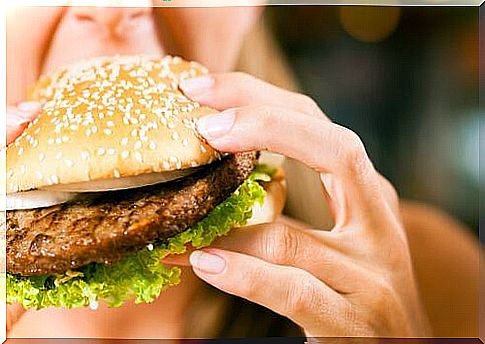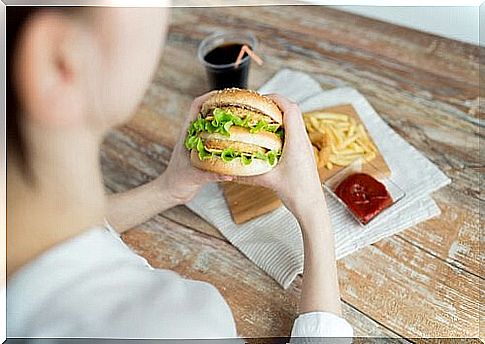Emotional Hunger: The Favorite Disguise Of Anxiety

We all know how hunger feels. When you have an empty stomach and you need to put something in your mouth, you are hungry. Of course, you know how to identify situations where you are really hungry after not eating for a while. But do you know how to distinguish them from emotional hunger?
Experts do not recommend starving yourself. They also do not recommend that more than four hours pass between meals, even if it is just a snack. But we do not always eat because we are actually hungry. Sometimes we eat to soothe our emotions. Stress, sadness, anxiety… We try to hide them under unhealthy food, which just makes it worse in the long run.
Do you want to stop the vicious circle of eating to get better and then feel guilty for eating? I encourage you to learn the difference between emotional hunger and hunger due to lack of energy in the body. Take the bull by the horns and learn to identify the signs of emotional hunger. Then you can take responsibility for your life and your eating habits.
Let’s get to know some of the characteristics of emotional hunger.
1. The urge for junk food as a sign of emotional hunger
Emotional hunger will never ask you to eat a plate of vegetables or a salad. It usually asks you to eat high-calorie, low-nutrient foods. You get a lot of cravings for sweets or foods with saturated fat. In other words, junk food.

2. One is insatiable
When you notice that you are hungry, you usually know how much food to eat. With emotional hunger, however, one can get to eat until one is oversaturated. Emotional hunger inhibits the feeling of satiety. As a result, we do not feel full until we are already well past that point.
3. One tries to fill a void
This void is not completely in the stomach. It responds to a kind of emotional imbalance. Instead of figuring out what the problem is, it gets buried under all the food we eat in an attempt to get better. The relief is temporary and will last as long as it takes to digest the food. But it does not last. When it’s over, we’ll probably feel worse off than we were before.
4. One is forced to eat alone
People almost never overeat with others around them. It is a kind of ritual that one does alone. Loneliness often causes overeating. However, one can also do it at events like weddings or birthdays to hide one’s feelings.
5. Guilt
We know we do not need that bag of potato chips. They will cause our cholesterol to rise, they are full of saturated fat and on top of it all we are not even hungry at all. We know all this, but we can not fight the urge. When we eat this type of food, we feel guilty. We feel the need to punish ourselves for losing control.
6. It’s impulsive
When we eat to satisfy our emotional hunger, we do so without thinking too much about it. It’s impulsive. We run down to the store and buy everything that looks good.
7. We use it to avoid liability
You have to work, you promised to go to the gym or to study… But you do not feel like it and you end up staying home. Deep down, you know you did not do what you said you would. The anxiety does not wait long before it comes and knocks on your door and keeps you company. And then you go in the fridge. You are looking for the thing that you long for and that calms you.
Once you have eaten something that is bad for you, you realize that you have gotten worse. Now you feel guilty about two things – of not having fulfilled your obligations, of having given in to your urge. Moreover, you realize that while you were eating, you did not feel worried. So you go back to the fridge for more… And you repeat the process until you are very, very full.
Ideas to satisfy your emotional hunger without looting the fridge
All of these traits are associated with emotional hunger. You just have to look for them in your own habits to be able to identify the problem. Then it’s time to fight the problem. Here are some ideas that may help you.
1. Try to eat something healthy
If you want to eat something but think it is due to emotional hunger, then test it with something healthy. If you are not physically hungry, you will not eat either, otherwise you will be satiated really quickly. Your body will tell you that this is not what you need. Then you know for sure that the feeling of hunger is not real.

2. Think about what may be causing the problem
When you know that you are experiencing urge to eat and not really hungry, think about what may be the root of the problem. Are you anxious about work? Are there problems on the home front? Have you been running around all day without breaks?
3. Motion
Exercise helps in two ways. First, it is a way to release negative emotions. Exercise produces endorphins that improve your mood. Endorphins also help fight anxiety. After exercise, your body needs energy and will be excited to get some healthy food.
4. Make a meal plan
This will help you avoid impulsive eating. If you keep an eye on when and how you eat, you will get a better sense of when you actually need new energy. This will make it harder for your body to fool you. Besides this, you have already chosen what to eat and so it is more likely that it is based on an intelligent decision.
5. Give in to the urge once in a while
Although emotional hunger usually responds to junk food, it’s good to give in to the urge once in a while. Just make sure it does not become a habit.
Eat with other people
When you eat with other people, you eat more slowly. One will probably not focus so much on one’s problems either. Another benefit is that you share the enjoyment between the company you are in and the food you eat. Thus, it will not be necessary to keep eating to get better.

7. Do not use food as a reward
Sometimes when we’ve had a bad day, we try to get better by eating junk food. We say to ourselves, ” I deserve this .” If you get used to dealing with bad days with junk food, you will not be able to focus on developing healthier eating habits.
8. Get help for the underlying emotional problem
Whether it’s a friend, family member, partner or professional, you need to find someone who can help you. Your attempts to hide the problem and deal with it yourself have not worked.
9. Think before you buy junk food
Why am I buying this? Do I really need it?
10. Make a shopping list of what you actually need
And do not buy more than what is written on the paper. We do not usually write junk food on the list. It tends to be the result of an impulsive action.
The best technique is to be aware of the body’s true needs and know if they are derived from one’s physical or emotional body. It is important to deal with difficult emotional situations proactively. You need to find out the reason behind it and then decide how to deal with it. Instead of swallowing your emotions, work on having a physically and mentally healthy life.









